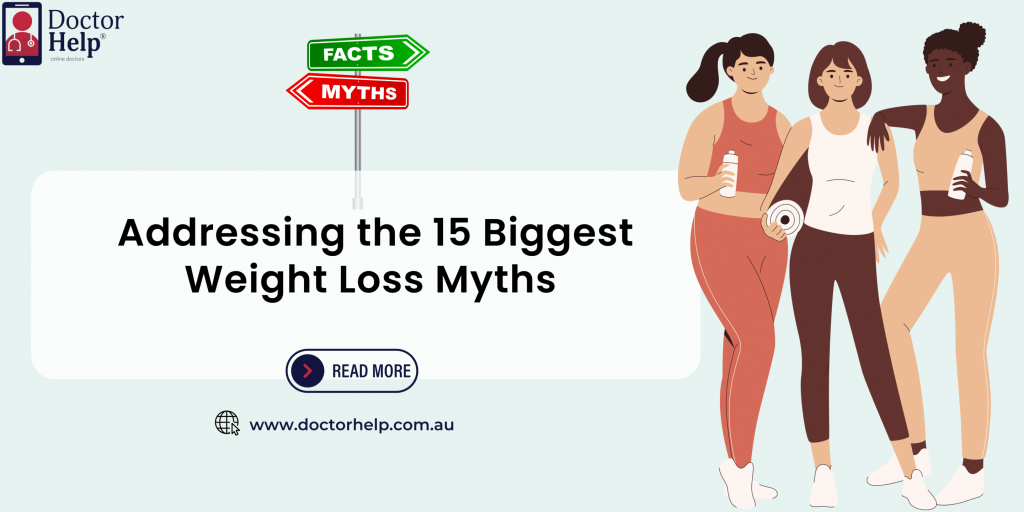Table of Contents
According to BetterHealth.vic.gov, In Australia, around 75% of men and 60% of women are car overweight and 25% of children are obese. With increasing body standards comes the desperation of getting into the race of weight and a person is ready to do whatever it takes to get into shape.
Have you been hearing tips that are weight loss myths from people around you regarding weight loss routines for example, Jogging is bad for your joints, cycling causes impotence, and weight training gives you bodybuilder’s muscles? All of these are weight loss myths and none of them are true!
Addressing Weight Loss Myths and Their Reality
This article debunks the 20 most well-known weight loss myths and removes your last excuse to avoid exercise or regular training at the gym.
1. Fat Burning Only Starts After 30 Minutes of Exercise.
This is not entirely true, the moment you begin to move, fat-burning starts. However, if you aim to burn body fat, exercise for more than half an hour. For persistence sports, make it challenging, fat burning is most efficient once you train at 70 to 80 percent of your maximum heart rate.
2. Sweating Means You’re Unfit.
In medically fit individuals sweating well means you have better thermoregulation than athletes. Their cells and muscles are more efficient and hence release more sweat during exertion, unlike non-athletic people.
3. Weight Training Builds Bulky Muscles.
Most women fear that weight training will give them masculine figures just like a bodybuilder. This weight loss myth has stopped many women from getting pure weight loss and strength training. Usually, muscle growth is determined by the male hormone testosterone, which is also produced in women’s bodies but in a very small amount. Weight training will shape their figure in a firmer and slimmer way.
4. Stretching Is Useless
Although there is an argument surrounding the experts, stretching could be replaced by a light warmup before exercise. But after the exercise, skipping stretching means you are inviting strains and muscle fatigue after exertion. Instead, avoid bouncing and hold a stretch for 20 seconds to recover from the exercise.
5. Athletes Need Special Nutrition.
Some of the immature athletes think they need to grab the vitamins, and protein from external sources like medication right after 30 mins jogging. These products are for professionals as these supplements won’t recover the muscles alone instead natural diet will make recovery easier and more effective for example having a banana and a juice spritzer.
6. You Don’t Lose Weight With Machine Training.
This weight loss myth has been surrounding many people but if you are consistent and do weight training even with machines, the effect is there! It’s better than not doing anything and staying inactive. Although, this shouldn’t worry you, as muscle weighs more than fat. Your basal metabolic rate is also increased with higher muscle mass. This is the reason why muscular people burn more fat than non-athletes even while sleeping.
7. Going To The Gym Once a Week Does Nothing.
Once a week is definitely better than never. If you are a beginner and hear this weight loss myth from people in your surroundings then remember that gradually increasing the tendency and time will help you get better results. A combination of strength and perseverance training increases performance, balances blood pressure levels, improves cholesterol, and boosts overall health.
8. Muscles Need To Hurt During Strength Training.
Never believe on this weight loss myth until your certified trainer says anything about the increased tendency of training. Lifting too much weight can easily lead to overexertion and increase the risk of muscle injury. If you want to tone your body then begin with light weight and repetition.
9. Sauna Makes You Slim.
Sweating opens the glands but it has nothing to do with fat loss. Especially in the sauna, the body loses water and minerals, but not a single gram of fat. So when you sweat out some pounds in the sauna immediately replace those with water.
10. Jogging is Bad For Your Joints.
Jogging increases joint functionality because the movement stimulates the production of joint fluid. This fluid nourishes the cartilage, keeping it healthy and functional. Severely overweight and inactive people can begin with walking to gradually acclimate their joints to movement.
11. Slow Running Melts The Pounds.
Another weight loss myth is slow running will burn the fat! Surely, when you walk or run slowly there is a constant activity going on in your body which is positive but you are not burning fat. The total energy consumption is much lower at lower intensity than at higher intensity. Take the example of a car that uses more fuel when driving fast, the body burns fatter at 70% to 80% of its maximum heart rate. If you are a beginner start slow then gradually increase calorie burn with short sprints.
12. Coffee Is a No-No For Athletes.
An espresso consumed an hour before weight training stimulates both circulation and energy consumption. Athletes use this as a secret tool before their training. So this weight loss myth is also not true that coffee increases blood pressure and dehydrates.
13. Muscle Soreness Means a Good Workout.
Never compare your muscle fatigue with the success of a workout, Sore muscles after a workout only mean one thing: you overdid it. This happens when the overexertion causes a small tear in the muscle indicating the overloading, not the muscle growth.
14. Back Muscle Training Helps With Back Pain
Altogether a targeted strength workout can help alleviate back pain. It is not the back muscles which matter but abdominal muscles also play a significant role. A balanced workout of both areas creates a strong torso that prevents hyperextension of the lower back. Also, keep in mind to stretch after training as it prevents muscle shortening.
15. Pregnant Women Shouldn’t Exercise
Recommended exercises by the specialist during pregnancy are generally beneficial for the mother and child. These help women recover after birth and help ease the process during childbirth. Although Pregnant women should avoid contact sports, competitive sports, skiing, and horse riding. Usually, doctors recommend light endurance exercises like walking or swimming are ideal but before you do any exercise make sure to consult a gynecologist first.
Conclusion
Weight loss myths that surround people can be addressed via consultation and doctor advice before starting your weight loss journey. Doctor Help makes it easier for you to consult with an online GP or get a specialist referral from the comfort of your home. Book Consultation now!








